So Long a Letter: A Study of Modernity and Tradition in Senegal
VerifiedAdded on 2021/12/29
|5
|1276
|243
Essay
AI Summary
This essay provides an analysis of Mariama Bâ's novel, 'So Long a Letter,' focusing on the clash between tradition and modernity within the context of Senegalese society. The essay examines the semi-autobiographical epistolary form, highlighting the experiences of women, particularly widows, in an Islamic society. It delves into the themes of polygamy, cultural expectations, and the impact of societal norms on women's lives, as seen through the experiences of Ramatoulaye and Aissatou. The essay explores the challenges faced by women in a post-colonial African setting, examining the tension between traditional customs and the evolving roles of women in a rapidly changing society. It discusses the characters' responses to societal pressures, the complexities of their relationships, and the broader implications for women's empowerment and agency. The essay also touches upon the themes of mourning, abandonment, and the search for identity and independence within a culturally rich yet sometimes restrictive environment. The essay analyzes the contrasting paths taken by the women in the novel and their responses to the societal norms of Senegal.
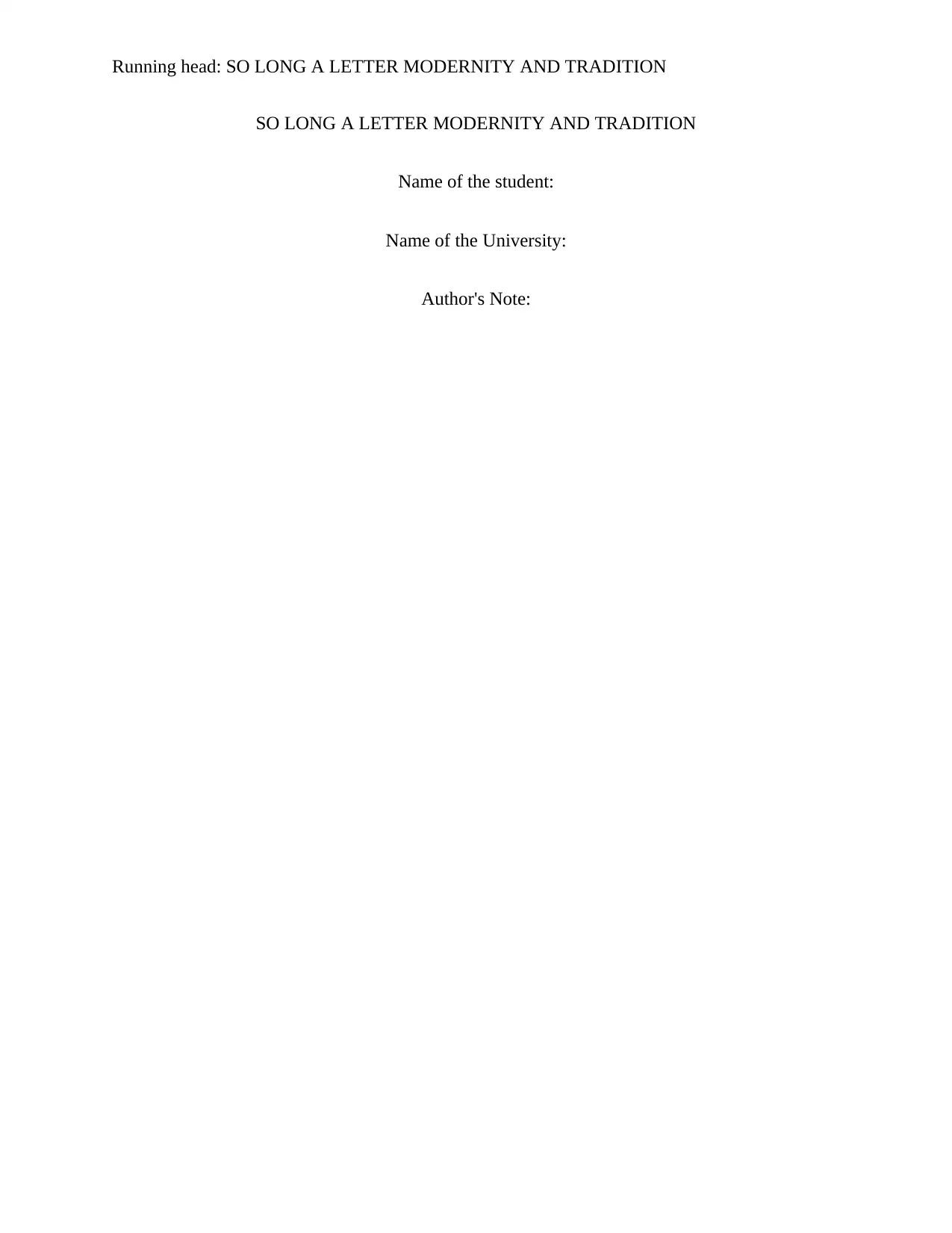
Running head: SO LONG A LETTER MODERNITY AND TRADITION
SO LONG A LETTER MODERNITY AND TRADITION
Name of the student:
Name of the University:
Author's Note:
SO LONG A LETTER MODERNITY AND TRADITION
Name of the student:
Name of the University:
Author's Note:
Paraphrase This Document
Need a fresh take? Get an instant paraphrase of this document with our AI Paraphraser
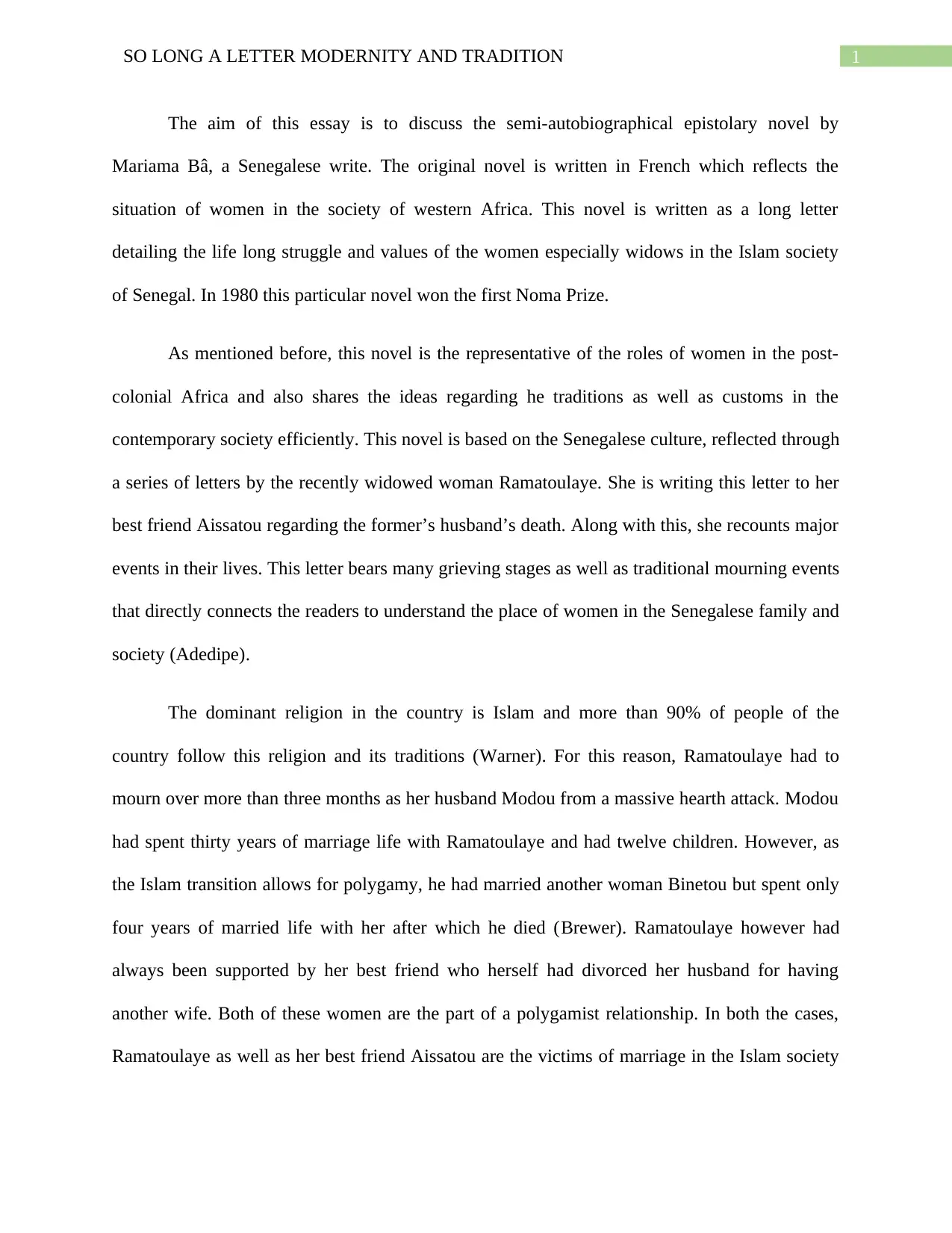
1SO LONG A LETTER MODERNITY AND TRADITION
The aim of this essay is to discuss the semi-autobiographical epistolary novel by
Mariama Bâ, a Senegalese write. The original novel is written in French which reflects the
situation of women in the society of western Africa. This novel is written as a long letter
detailing the life long struggle and values of the women especially widows in the Islam society
of Senegal. In 1980 this particular novel won the first Noma Prize.
As mentioned before, this novel is the representative of the roles of women in the post-
colonial Africa and also shares the ideas regarding he traditions as well as customs in the
contemporary society efficiently. This novel is based on the Senegalese culture, reflected through
a series of letters by the recently widowed woman Ramatoulaye. She is writing this letter to her
best friend Aissatou regarding the former’s husband’s death. Along with this, she recounts major
events in their lives. This letter bears many grieving stages as well as traditional mourning events
that directly connects the readers to understand the place of women in the Senegalese family and
society (Adedipe).
The dominant religion in the country is Islam and more than 90% of people of the
country follow this religion and its traditions (Warner). For this reason, Ramatoulaye had to
mourn over more than three months as her husband Modou from a massive hearth attack. Modou
had spent thirty years of marriage life with Ramatoulaye and had twelve children. However, as
the Islam transition allows for polygamy, he had married another woman Binetou but spent only
four years of married life with her after which he died (Brewer). Ramatoulaye however had
always been supported by her best friend who herself had divorced her husband for having
another wife. Both of these women are the part of a polygamist relationship. In both the cases,
Ramatoulaye as well as her best friend Aissatou are the victims of marriage in the Islam society
The aim of this essay is to discuss the semi-autobiographical epistolary novel by
Mariama Bâ, a Senegalese write. The original novel is written in French which reflects the
situation of women in the society of western Africa. This novel is written as a long letter
detailing the life long struggle and values of the women especially widows in the Islam society
of Senegal. In 1980 this particular novel won the first Noma Prize.
As mentioned before, this novel is the representative of the roles of women in the post-
colonial Africa and also shares the ideas regarding he traditions as well as customs in the
contemporary society efficiently. This novel is based on the Senegalese culture, reflected through
a series of letters by the recently widowed woman Ramatoulaye. She is writing this letter to her
best friend Aissatou regarding the former’s husband’s death. Along with this, she recounts major
events in their lives. This letter bears many grieving stages as well as traditional mourning events
that directly connects the readers to understand the place of women in the Senegalese family and
society (Adedipe).
The dominant religion in the country is Islam and more than 90% of people of the
country follow this religion and its traditions (Warner). For this reason, Ramatoulaye had to
mourn over more than three months as her husband Modou from a massive hearth attack. Modou
had spent thirty years of marriage life with Ramatoulaye and had twelve children. However, as
the Islam transition allows for polygamy, he had married another woman Binetou but spent only
four years of married life with her after which he died (Brewer). Ramatoulaye however had
always been supported by her best friend who herself had divorced her husband for having
another wife. Both of these women are the part of a polygamist relationship. In both the cases,
Ramatoulaye as well as her best friend Aissatou are the victims of marriage in the Islam society
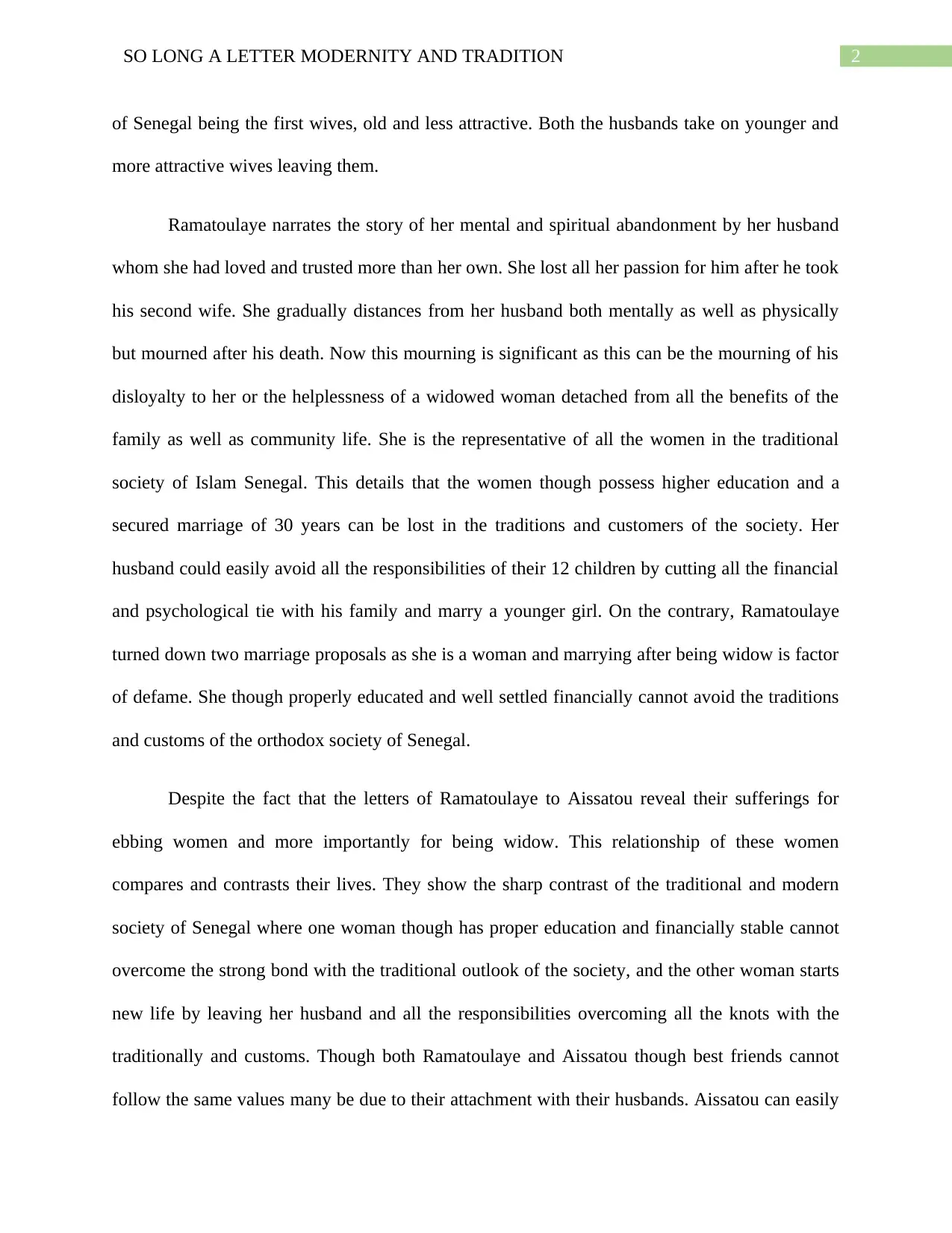
2SO LONG A LETTER MODERNITY AND TRADITION
of Senegal being the first wives, old and less attractive. Both the husbands take on younger and
more attractive wives leaving them.
Ramatoulaye narrates the story of her mental and spiritual abandonment by her husband
whom she had loved and trusted more than her own. She lost all her passion for him after he took
his second wife. She gradually distances from her husband both mentally as well as physically
but mourned after his death. Now this mourning is significant as this can be the mourning of his
disloyalty to her or the helplessness of a widowed woman detached from all the benefits of the
family as well as community life. She is the representative of all the women in the traditional
society of Islam Senegal. This details that the women though possess higher education and a
secured marriage of 30 years can be lost in the traditions and customers of the society. Her
husband could easily avoid all the responsibilities of their 12 children by cutting all the financial
and psychological tie with his family and marry a younger girl. On the contrary, Ramatoulaye
turned down two marriage proposals as she is a woman and marrying after being widow is factor
of defame. She though properly educated and well settled financially cannot avoid the traditions
and customs of the orthodox society of Senegal.
Despite the fact that the letters of Ramatoulaye to Aissatou reveal their sufferings for
ebbing women and more importantly for being widow. This relationship of these women
compares and contrasts their lives. They show the sharp contrast of the traditional and modern
society of Senegal where one woman though has proper education and financially stable cannot
overcome the strong bond with the traditional outlook of the society, and the other woman starts
new life by leaving her husband and all the responsibilities overcoming all the knots with the
traditionally and customs. Though both Ramatoulaye and Aissatou though best friends cannot
follow the same values many be due to their attachment with their husbands. Aissatou can easily
of Senegal being the first wives, old and less attractive. Both the husbands take on younger and
more attractive wives leaving them.
Ramatoulaye narrates the story of her mental and spiritual abandonment by her husband
whom she had loved and trusted more than her own. She lost all her passion for him after he took
his second wife. She gradually distances from her husband both mentally as well as physically
but mourned after his death. Now this mourning is significant as this can be the mourning of his
disloyalty to her or the helplessness of a widowed woman detached from all the benefits of the
family as well as community life. She is the representative of all the women in the traditional
society of Islam Senegal. This details that the women though possess higher education and a
secured marriage of 30 years can be lost in the traditions and customers of the society. Her
husband could easily avoid all the responsibilities of their 12 children by cutting all the financial
and psychological tie with his family and marry a younger girl. On the contrary, Ramatoulaye
turned down two marriage proposals as she is a woman and marrying after being widow is factor
of defame. She though properly educated and well settled financially cannot avoid the traditions
and customs of the orthodox society of Senegal.
Despite the fact that the letters of Ramatoulaye to Aissatou reveal their sufferings for
ebbing women and more importantly for being widow. This relationship of these women
compares and contrasts their lives. They show the sharp contrast of the traditional and modern
society of Senegal where one woman though has proper education and financially stable cannot
overcome the strong bond with the traditional outlook of the society, and the other woman starts
new life by leaving her husband and all the responsibilities overcoming all the knots with the
traditionally and customs. Though both Ramatoulaye and Aissatou though best friends cannot
follow the same values many be due to their attachment with their husbands. Aissatou can easily
⊘ This is a preview!⊘
Do you want full access?
Subscribe today to unlock all pages.

Trusted by 1+ million students worldwide
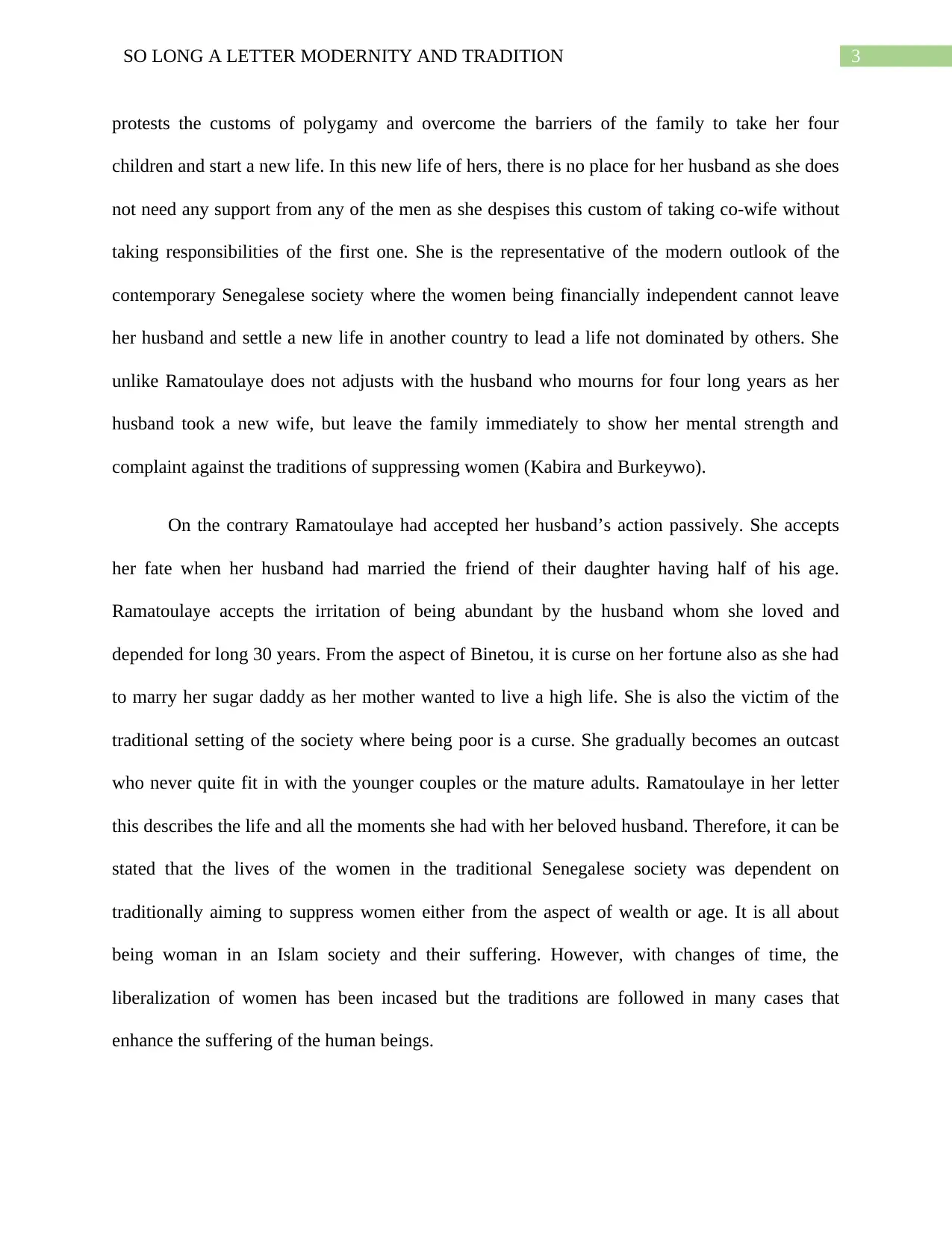
3SO LONG A LETTER MODERNITY AND TRADITION
protests the customs of polygamy and overcome the barriers of the family to take her four
children and start a new life. In this new life of hers, there is no place for her husband as she does
not need any support from any of the men as she despises this custom of taking co-wife without
taking responsibilities of the first one. She is the representative of the modern outlook of the
contemporary Senegalese society where the women being financially independent cannot leave
her husband and settle a new life in another country to lead a life not dominated by others. She
unlike Ramatoulaye does not adjusts with the husband who mourns for four long years as her
husband took a new wife, but leave the family immediately to show her mental strength and
complaint against the traditions of suppressing women (Kabira and Burkeywo).
On the contrary Ramatoulaye had accepted her husband’s action passively. She accepts
her fate when her husband had married the friend of their daughter having half of his age.
Ramatoulaye accepts the irritation of being abundant by the husband whom she loved and
depended for long 30 years. From the aspect of Binetou, it is curse on her fortune also as she had
to marry her sugar daddy as her mother wanted to live a high life. She is also the victim of the
traditional setting of the society where being poor is a curse. She gradually becomes an outcast
who never quite fit in with the younger couples or the mature adults. Ramatoulaye in her letter
this describes the life and all the moments she had with her beloved husband. Therefore, it can be
stated that the lives of the women in the traditional Senegalese society was dependent on
traditionally aiming to suppress women either from the aspect of wealth or age. It is all about
being woman in an Islam society and their suffering. However, with changes of time, the
liberalization of women has been incased but the traditions are followed in many cases that
enhance the suffering of the human beings.
protests the customs of polygamy and overcome the barriers of the family to take her four
children and start a new life. In this new life of hers, there is no place for her husband as she does
not need any support from any of the men as she despises this custom of taking co-wife without
taking responsibilities of the first one. She is the representative of the modern outlook of the
contemporary Senegalese society where the women being financially independent cannot leave
her husband and settle a new life in another country to lead a life not dominated by others. She
unlike Ramatoulaye does not adjusts with the husband who mourns for four long years as her
husband took a new wife, but leave the family immediately to show her mental strength and
complaint against the traditions of suppressing women (Kabira and Burkeywo).
On the contrary Ramatoulaye had accepted her husband’s action passively. She accepts
her fate when her husband had married the friend of their daughter having half of his age.
Ramatoulaye accepts the irritation of being abundant by the husband whom she loved and
depended for long 30 years. From the aspect of Binetou, it is curse on her fortune also as she had
to marry her sugar daddy as her mother wanted to live a high life. She is also the victim of the
traditional setting of the society where being poor is a curse. She gradually becomes an outcast
who never quite fit in with the younger couples or the mature adults. Ramatoulaye in her letter
this describes the life and all the moments she had with her beloved husband. Therefore, it can be
stated that the lives of the women in the traditional Senegalese society was dependent on
traditionally aiming to suppress women either from the aspect of wealth or age. It is all about
being woman in an Islam society and their suffering. However, with changes of time, the
liberalization of women has been incased but the traditions are followed in many cases that
enhance the suffering of the human beings.
Paraphrase This Document
Need a fresh take? Get an instant paraphrase of this document with our AI Paraphraser
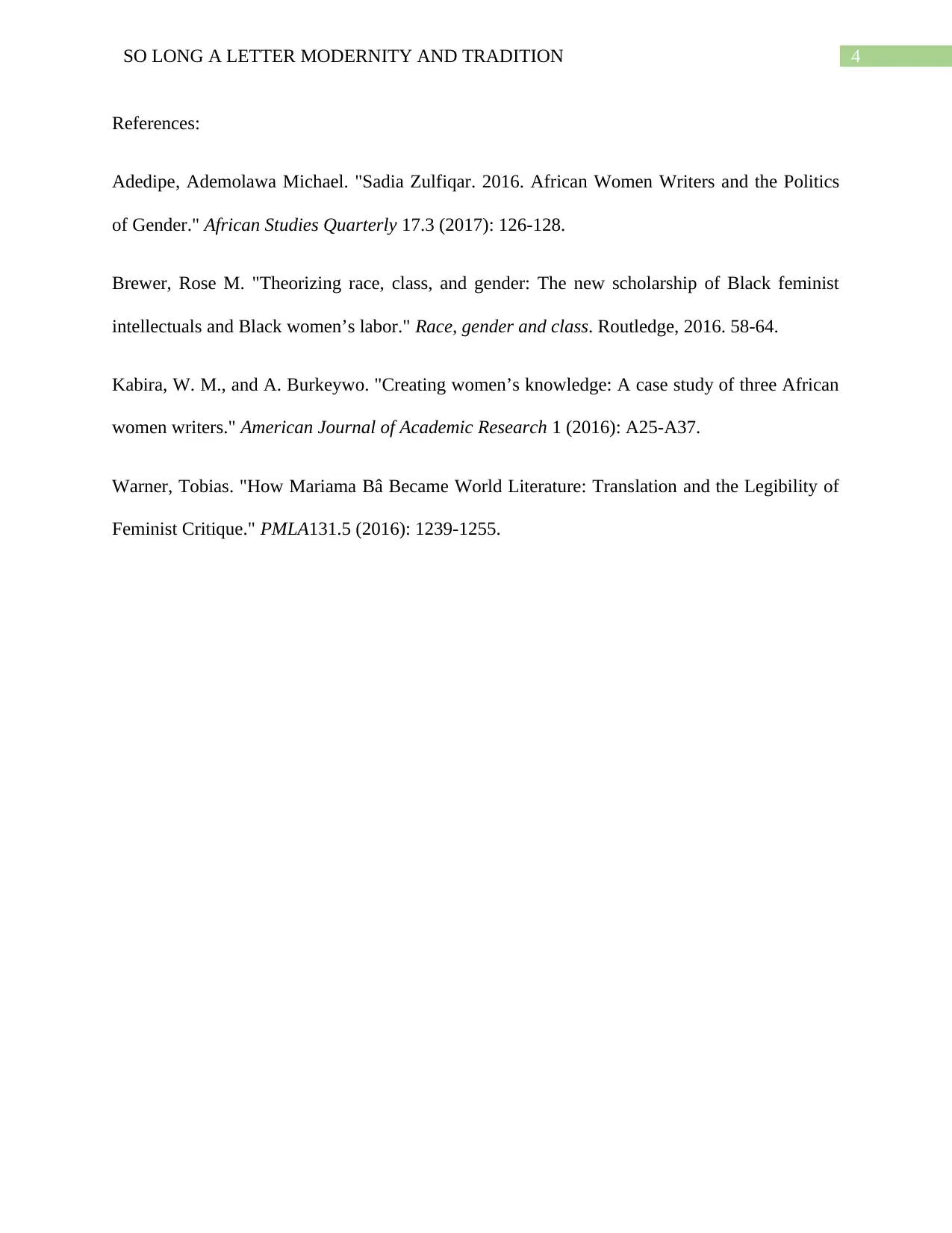
4SO LONG A LETTER MODERNITY AND TRADITION
References:
Adedipe, Ademolawa Michael. "Sadia Zulfiqar. 2016. African Women Writers and the Politics
of Gender." African Studies Quarterly 17.3 (2017): 126-128.
Brewer, Rose M. "Theorizing race, class, and gender: The new scholarship of Black feminist
intellectuals and Black women’s labor." Race, gender and class. Routledge, 2016. 58-64.
Kabira, W. M., and A. Burkeywo. "Creating women’s knowledge: A case study of three African
women writers." American Journal of Academic Research 1 (2016): A25-A37.
Warner, Tobias. "How Mariama Bâ Became World Literature: Translation and the Legibility of
Feminist Critique." PMLA131.5 (2016): 1239-1255.
References:
Adedipe, Ademolawa Michael. "Sadia Zulfiqar. 2016. African Women Writers and the Politics
of Gender." African Studies Quarterly 17.3 (2017): 126-128.
Brewer, Rose M. "Theorizing race, class, and gender: The new scholarship of Black feminist
intellectuals and Black women’s labor." Race, gender and class. Routledge, 2016. 58-64.
Kabira, W. M., and A. Burkeywo. "Creating women’s knowledge: A case study of three African
women writers." American Journal of Academic Research 1 (2016): A25-A37.
Warner, Tobias. "How Mariama Bâ Became World Literature: Translation and the Legibility of
Feminist Critique." PMLA131.5 (2016): 1239-1255.
1 out of 5
Related Documents
Your All-in-One AI-Powered Toolkit for Academic Success.
+13062052269
info@desklib.com
Available 24*7 on WhatsApp / Email
![[object Object]](/_next/static/media/star-bottom.7253800d.svg)
Unlock your academic potential
Copyright © 2020–2026 A2Z Services. All Rights Reserved. Developed and managed by ZUCOL.





